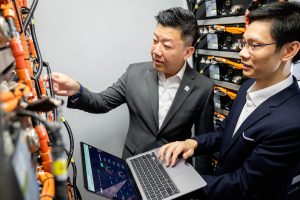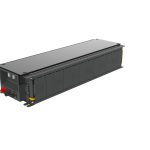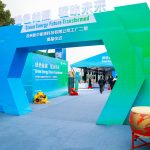NTU Singapore and Durapower develop cloud-based AI tech for safer and longer-lasting batteries
Singapore, 8 November 2023
Scientists from Nanyang Technological University, Singapore (NTU Singapore) and Durapower Technology Singapore Pte Ltd have developed a cloud-based technology that can greatly enhance the lifespan and safety of lithium-ion batteries.
As the global shift towards renewable energy and electric vehicles (EVs) accelerates, the demand for efficient, safe and sustainable batteries has become a pressing concern. Similarly, with the rise in cloud computing, the demand for energy storage systems for data centres has been growing.
Powered by the Internet of Things (IoT) and Artificial Intelligence (AI), this new solution can help companies and data centres lower the risks associated with lithium-ion batteries, including potential fire hazards, particularly in hot and humid climates like Singapore.
Led by NTU Assistant Professor Hung Dinh Nguyen and Durapower CEO Mr Kelvin Lim, this research project is supported by the Energy Market Authority (EMA) and the National Research Foundation, Singapore (NRF), under the Research, Innovation and Enterprise (RIE) 2020 Plan.
Over the last four years, the joint team developed a Fire & Explosion Management System (FXMS), which utilises Digital Twin technology – where a virtual replica of an actual battery is created to mirror the one in real life – offering high-accuracy, real-time monitoring, as well as predictions of battery conditions up to five years.
The FXMS can provide regular monitoring of which battery pack is likely to fail and can predict when will be a good time to replace it, with up to 95 percent accuracy, up to over six months in the future. Currently, it is being tested in a container-sized data centre on the NTU Smart Campus.
The team estimates that their patent-pending technology can help to extend the lifespan of lithium-ion batteries by more than 50 percent, significantly reducing carbon emission through the reduction of battery waste, as batteries require a lot of resources and energy to manufacture.

Asst Prof Hung Dinh Nguyen, who is the Cluster Director of Renewables’ Integration & Microgrids at the Energy Research Institute at NTU (ERI@N), explained, “Our main aim is to enhance the safety and efficiency of large-scale energy storage systems and Electric Vehicles, as a single faulty cell can spark off a chemical fire that is extremely hard to put out. Since our technology is cloud-based, it is scalable and can easily be adapted for consumer electronics such as mobility devices, laptops and mobile phones, helping the batteries to last longer and in the long run, reduce electronic waste and carbon footprint,”
Chief Executive Officer of Durapower Group, Mr Kelvin Lim commented, “With the global mandate for sustainability, smart mobility, and a carbon neutral future, we’re seeing widespread adoption of energy storage systems and uptake of EVs. The development of a customisable software platform like FXMS furthers efforts towards robust and comprehensive digital infrastructure based on Machine Learning and Artificial Intelligence to capture increasingly complex battery and energy usage in the EV market. The outcomes from this joint initiative with the EMA, NTU and Durapower on FXMS will enable better decisions based on data and analytics, facilitating optimal battery health, performance, and longevity.”
NTU Vice President (Industry) Professor Lam Khin Yong, said the collaboration between NTU and Durapower demonstrates how new technology in the green economy can be pioneered through a strong academia-industry partnership supported by the Singapore government.
“NTU has a strong track record in working closely with leading industry players, to develop innovations that can meet the key challenges in their sector. Combining our deep expertise in areas such as sustainability, battery technology and deep tech like IoT and AI, with Durapower’s industry knowledge and experience, we can propel innovation quicker and boost the competitiveness of our local SMEs globally in fast-rising industries such as EVs and energy storage systems.”
Digital Twins, which are virtual replicas of facilities or objects in the real world, are a pivotal development in the Infocomm industry, as it enables more effective and safer decision-making through AI recommendations. It is also a research area strongly supported by the NTU 2025 Strategic Plan, under its Innovation & Entrepreneurship initiative launched earlier this year.
In the case of large battery storage systems like those used for renewable energy grids or data centres, the digital twin allows for the direct management of batteries, such as rerouting electrical load to prolong the life of weaker batteries or to temporarily stop the use of a battery pack until it can be replaced.
As battery packs age, such as those in EVs, they are commonly used for second-life applications such as energy storage and finally be recycled into new lithium-ion batteries. The ERI@N is currently developing solutions for all aspects of battery storage, from battery management systems to the manufacturing of batteries.
Moving forward, the NTU team will work closely with Durapower to trial their solution on larger data centres and to customise it for different applications and battery systems.
About Durapower Group
Headquartered in Singapore, Durapower offers closed-loop, end-to-end energy storage solutions for the electric mobility and renewable energy applications including on and off-road Electric, Hybrid and Plug-in Hybrid Electric Vehicles, electric marine vessel and stationary energy storage solutions. Since 2009, Durapower has been a leading innovator of Lithium-Ion cell technology, focusing on the research and development of battery materials, battery cell manufacturing and system integration. With a global presence spanning 25 countries and 70 cities, including European Countries, China, India and Southeast Asia. Durapower Group strives to make scalable, sustainable batteries that support the circular economy, empowering lives and transforming the future towards a carbon-neutral economy. Durapower does not manufacture, sell or distribute batteries intended for use in relation to household or consumer electronics.
About Nanyang Technological University, Singapore
A research-intensive public university, Nanyang Technological University, Singapore (NTU Singapore) has 33,000 undergraduate and postgraduate students in the Engineering, Business, Science, Medicine, Humanities, Arts, & Social Sciences, and Graduate colleges.NTU is also home to world-renowned autonomous institutes – the National Institute of Education, S Rajaratnam School of International Studies and Singapore Centre for Environmental Life Sciences Engineering – and various leading research centres such as the Earth Observatory of Singapore, Nanyang Environment & Water Research Institute and Energy Research Institute @ NTU (ERI@N).Under the NTU Smart Campus vision, the University harnesses the power of digital technology and tech-enabled solutions to support better learning and living experiences, the discovery of new knowledge, and the sustainability of resources.Ranked amongst the world’s top universities, the University’s main campus is also frequently listed among the world’s most beautiful. Known for its sustainability, NTU has achieved 100% Green Mark Platinum certification for all its eligible building projects. Apart from its main campus, NTU also has a medical campus in Novena, Singapore’s healthcare district.
For more information, visit www.ntu.edu.sg





